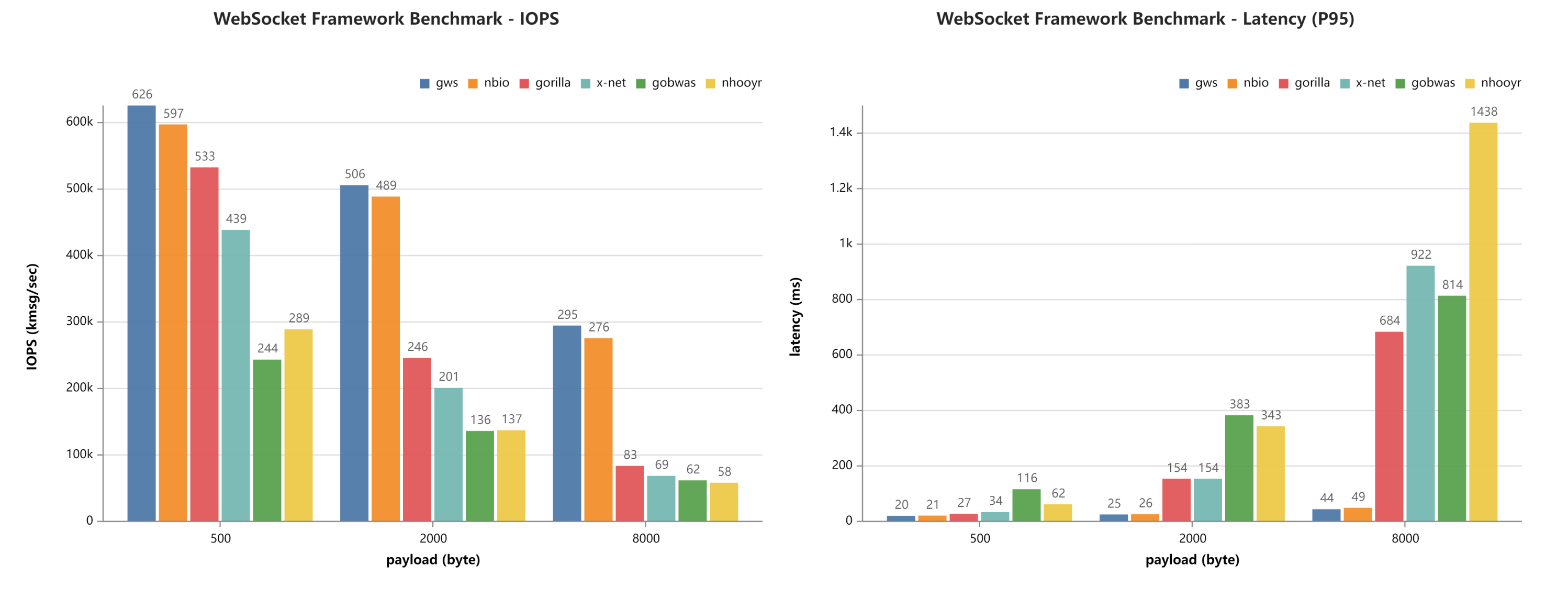GWS (Go WebSocket) is a very simple, fast, reliable and feature-rich WebSocket implementation written in Go. It is
designed to be used in highly-concurrent environments, and it is suitable for
building API, Proxy, Game, Live Video, Message, etc. It supports both server and client side with a simple API
which mean you can easily write a server or client by yourself.
GWS developed base on Event-Driven model. every connection has a goroutine to handle the event, and the event is able to be processed in a non-blocking way.
-
Simplicity and Ease of Use
- User-Friendly: Simple and clear
WebSocketEvent API design makes server-client interaction easy. - Code Efficiency: Minimizes the amount of code needed to implement complex WebSocket solutions.
- User-Friendly: Simple and clear
-
High-Performance
- High IOPS Low Latency: Designed for rapid data transmission and reception, ideal for time-sensitive applications.
- Low Memory Usage: Highly optimized memory multiplexing system to minimize memory usage and reduce your cost of ownership.
-
Reliability and Stability
- Robust Error Handling: Advanced mechanisms to manage and mitigate errors, ensuring continuous operation.
- Well-Developed Test Cases: Passed all
Autobahntest cases, fully compliant withRFC 6455. 99% unit test coverage, covering almost all conditional branches.
GOMAXPROCS=4, Connection=1000, CompressEnabled=false
gorilla and nhooyr not using streaming api
goos: linux
goarch: amd64
pkg: github.com/lxzan/gws
cpu: AMD Ryzen 5 PRO 4650G with Radeon Graphics
BenchmarkConn_WriteMessage/compress_disabled-8 7252513 165.4 ns/op 0 B/op 0 allocs/op
BenchmarkConn_WriteMessage/compress_enabled-8 97394 10391 ns/op 349 B/op 0 allocs/op
BenchmarkConn_ReadMessage/compress_disabled-8 7812108 152.3 ns/op 16 B/op 0 allocs/op
BenchmarkConn_ReadMessage/compress_enabled-8 368712 3248 ns/op 108 B/op 0 allocs/op
PASS- Introduction
- Why GWS
- Benchmark
- Index
- Feature
- Attention
- Install
- Event
- Quick Start
- Best Practice
- More Examples
- Autobahn Test
- Communication
- Acknowledgments
- Event API
- Broadcast
- Dial via Proxy
- Zero Allocs Read / Write
- Concurrent & Asynchronous Non-Blocking Write
- Passed WebSocket Autobahn-Testsuite
- The errors returned by the gws.Conn export methods are ignorable, and are handled internally.
- Transferring large files with gws tends to block the connection.
- If HTTP Server is reused, it is recommended to enable goroutine, as blocking will prevent the context from being GC.
go get -v github.com/lxzan/gws@latesttype Event interface {
OnOpen(socket *Conn) // connection is established
OnClose(socket *Conn, err error) // received a close frame or I/O error occurs
OnPing(socket *Conn, payload []byte) // received a ping frame
OnPong(socket *Conn, payload []byte) // received a pong frame
OnMessage(socket *Conn, message *Message) // received a text/binary frame
}Very, very, very simple example.
The example let you know how to use the gws package without any other dependencies.
package main
import "github.com/lxzan/gws"
func main() {
gws.NewServer(&gws.BuiltinEventHandler{}, nil).Run(":6666")
}package main
import (
"github.com/lxzan/gws"
"net/http"
"time"
)
const (
PingInterval = 5 * time.Second
PingWait = 10 * time.Second
)
func main() {
upgrader := gws.NewUpgrader(&Handler{}, &gws.ServerOption{
ReadAsyncEnabled: true, // Parallel message processing
CompressEnabled: true, // Enable compression
Recovery: gws.Recovery, // Exception recovery
})
http.HandleFunc("/connect", func(writer http.ResponseWriter, request *http.Request) {
socket, err := upgrader.Upgrade(writer, request)
if err != nil {
return
}
go func() {
socket.ReadLoop() // Blocking prevents the context from being GC.
}()
})
http.ListenAndServe(":6666", nil)
}
type Handler struct{}
func (c *Handler) OnOpen(socket *gws.Conn) {
_ = socket.SetDeadline(time.Now().Add(PingInterval + PingWait))
}
func (c *Handler) OnClose(socket *gws.Conn, err error) {}
func (c *Handler) OnPing(socket *gws.Conn, payload []byte) {
_ = socket.SetDeadline(time.Now().Add(PingInterval + PingWait))
_ = socket.WritePong(nil)
}
func (c *Handler) OnPong(socket *gws.Conn, payload []byte) {}
func (c *Handler) OnMessage(socket *gws.Conn, message *gws.Message) {
defer message.Close()
socket.WriteMessage(message.Opcode, message.Bytes())
}- server
package main
import (
"log"
"github.com/lxzan/gws"
kcp "github.com/xtaci/kcp-go"
)
func main() {
listener, err := kcp.Listen(":6666")
if err != nil {
log.Println(err.Error())
return
}
app := gws.NewServer(&gws.BuiltinEventHandler{}, nil)
app.RunListener(listener)
}- client
package main
import (
"github.com/lxzan/gws"
kcp "github.com/xtaci/kcp-go"
"log"
)
func main() {
conn, err := kcp.Dial("127.0.0.1:6666")
if err != nil {
log.Println(err.Error())
return
}
app, _, err := gws.NewClientFromConn(&gws.BuiltinEventHandler{}, nil, conn)
if err != nil {
log.Println(err.Error())
return
}
app.ReadLoop()
}Dial via proxy, using socks5 protocol.
package main
import (
"crypto/tls"
"github.com/lxzan/gws"
"golang.org/x/net/proxy"
"log"
)
func main() {
socket, _, err := gws.NewClient(new(gws.BuiltinEventHandler), &gws.ClientOption{
Addr: "wss://example.com/connect",
TlsConfig: &tls.Config{InsecureSkipVerify: true},
NewDialer: func() (gws.Dialer, error) {
return proxy.SOCKS5("tcp", "127.0.0.1:1080", nil, nil)
},
})
if err != nil {
log.Println(err.Error())
return
}
socket.ReadLoop()
}Create a Broadcaster instance, call the Broadcast method in a loop to send messages to each client, and close the broadcaster to reclaim memory. The message is compressed only once.
func Broadcast(conns []*gws.Conn, opcode gws.Opcode, payload []byte) {
var b = gws.NewBroadcaster(opcode, payload)
defer b.Close()
for _, item := range conns {
_ = b.Broadcast(item)
}
}Use the event_emitter package to implement the publish-subscribe model. Wrap gws.Conn in a structure and implement the GetSubscriberID method to get the subscription ID, which must be unique. The subscription ID is used to identify the subscriber, who can only receive messages on the subject of his subscription.
This example is useful for building chat rooms or push messages using gws. This means that a user can subscribe to one or more topics via websocket, and when a message is posted to that topic, all subscribers will receive the message.
package main
import (
"github.com/lxzan/event_emitter"
"github.com/lxzan/gws"
)
type Socket struct{ *gws.Conn }
func (c *Socket) GetSubscriberID() int64 {
userId, _ := c.Session().Load("userId")
return userId.(int64)
}
func (c *Socket) GetMetadata() event_emitter.Metadata {
return c.Conn.Session()
}
func Sub(em *event_emitter.EventEmitter[*Socket], topic string, socket *Socket) {
em.Subscribe(socket, topic, func(subscriber *Socket, msg any) {
_ = msg.(*gws.Broadcaster).Broadcast(subscriber.Conn)
})
}
func Pub(em *event_emitter.EventEmitter[*Socket], topic string, op gws.Opcode, msg []byte) {
var broadcaster = gws.NewBroadcaster(op, msg)
defer broadcaster.Close()
em.Publish(topic, broadcaster)
}cd examples/autobahn
mkdir reports
docker run -it --rm \
-v ${PWD}/config:/config \
-v ${PWD}/reports:/reports \
crossbario/autobahn-testsuite \
wstest -m fuzzingclient -s /config/fuzzingclient.json微信需要先添加好友, 然后拉人入群, 请注明来意.
The following project had particular influence on gws's design.





